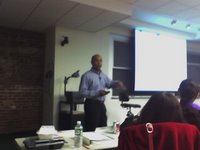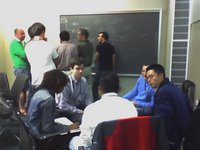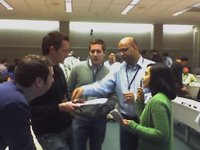
An exclusive interview with the behind the scenes Wharton Finance 602 TA (aka as "Mister T") revealed the approach he took for last weekend's mid-term exam: Pain!
Note to Class 33 next year: last weekend's mid-term exams were very painful! Ouch, it still hurts.
Here's some of the adjectives used to descibe the feeling after last weekend's Macro (and Statistics) mid-term exams:
"I am humbled. I studied the old WEMBA exams and thought I would be good to go. I was wrong."
"Paaaain, as in Clubber Lang / Mister T in Rocky III" -Zach
"Sadistic"
"My brain is numb"
"Hammer time"
"If the null is low, the exam must go"
After some amount of discussion from what we heard from Class 31, the best premise I heard is that Abel needed to crank the difficulty index up because Class 31 destroyed last year's mid-term. This year? It was like the 49ers versus the Bears on Sunday: Abel 41, Us 10. He cranked it up two or three notches. And those ten points were in garbage time. Good thing he took out the extra question at the end, or it would have been Abel 55, Us 3. Under/over on the mean is about 50% or so. There were a lot of field goal kickers in our class, which translates into "go for partial credit and hope he's merciful".
After the game, Coach Abel was very upbeat and was willing to talk to the press. Here's what he said:
"As Yogi Berra said when the Yankees lost the World Series, at least nobody died."
"There can theoretically be negative scores but it usually doesn't happen."
We also did two other interesting things this past week: vote for electives (first round to narrow it down to 30), and vote for the International Study Tour for next year.
Voting for Electives
Voting for electives was interesting because Robert published the survey monkey results prior to the voting. My strategy as well as others I talked to was to vote for electives that weren't on the "for sure" list. This could backfire if all of us used this approach, which would result in less of the "for sure" list being in the second round. Here's the list from Robert:
Courses VERY likely to be in the Top 30:
LGST 806 Negotiations
FNCE 728 Corporate Valuation
MKTG 777 Marketing Strategy
FNCE 726 Advanced Corporate Finance
FNCE 717 Financial Derivatives
FNCE 751x Mergers, Acquisitions & Buyouts
MGMT 721 Corporate Development: M&A
FNCE 750 Venture Capital & the Finance of Innovation
FNCE 720 Investment Management
FNCE 804 Venture Capital & Private Equity Management
MKTG 756 Marketing Research
MGMT 782 Strategic Implementation
MKTG 753 New Product Development
MKTG 754 Pricing Policy
OPIM 654 Product Design & Development
FNCE 721 Real Estate Investments
MKTG 771 Models for Marketing Strategy
MGMT 701 Strategic Planning & Control
MGMT 804 Venture Capital & Entrepreneurial Mgmt.
Courses SOMEWHAT likely to be in the Top 30:
MGMT 671 Total Leadership
MGMT 811 Entrepreneurship Through Acquisition
MKTG 751 Sales Force Management
MGMT 801 Entrepreneurship & Venture Initiation
ACCT 742 Problems in Financial Reporting
MKTG 781 Entrepreneurial Marketing
FNCE 738 Funding Investments
HCMG 863 Management & Econ of Pharma & Biotech Industry
MGMT 773 Managing Organizational Change
MGMT 809 Private Equity in Emerging Markets (write-in)
HCMG 849 Financial Management of Health Institutions
MGMT 802 Innovation, Change and Entrepreneurship
REAL 721 Real Estate Finance
FNCE 748 International/Multinational Corporate Finance
LGST 809 Sports Business Management
FNCE 731 International Corporate Finance
INSR 811 Risk & Crisis Management
REAL 891 Real Estate Entrepreneurship
Courses UNLIKELY to be in the Top 30:
ACCT 743 Acctg for Complex Financial Structures
OPIM 653 Mathematical Modeling
MGMT 731 Technology Strategy (write-in)
OPIM 666 Industry Structure & Competitive Strategy
LGST 813 Entrepreneurial Law
MGMT 715 Geopolitics
MGMT 806 Formation & Implementation Entrpnl Ventures
REAL 804 Real Estate Law
OPIM 658 Service Operations Management
OPIM 667 Business Transformation (write-in)
MKTG/OPIM 655 Integrating Marketing and Operations
MGMT/BPUB 784 Managerial Economics & Game Theory
FNCE 890 Global Investment Banking
MKTG 759 Channel Management
REAL 728 Security Analysis
MGMT 625 Corporate Governance
International Study Tour Results
Well, WEMBA Class 32 West is headed to Brazil, which Sandra announced this morning. Tudo Bem! (I need to set the record straight: I was not on the Brazil committee nor did I communicate with them prior to my post on the tour.) Props out to Clifton, who did a fabulous job on the presentation! The word on the street is that WEMBA Class 32 East is headed to China. It would be interesting to allow the two classes to mix participation in the trips, which would allow people interested in one country versus choice of study tour. It would also be most excellent to network with our east counterparts again. There's been some email threads about safety, which I think is a valid concern no matter where we go. The question I gotta ask is: why didn't someone address that issue in the pitches? But being the good statisticians that we are being trained to be, it caused me to go research the crime rates out there. Frank made the correct conclusion about it being more dangerous in the US than in the rest of the world per 1000 people.

Here's Clifton delivering the winning pitch for Brazil. We are headed to Sao Paulo and/or Rio...

Zia and the "China Angels" (Alice, Jenn, and Judy) won the "Best costume" award for their presentation.
The Value of a Wharton Degree
This Friday Class 31 is hosting an alumni panel that will be discussing the value of a Wharton degree. All this elective voting has forced us to start thinking (if we hadn't already) about what we are going to do post-MBA. It should be valuable and interesting to hear the alumni perspective on this subject. Of course it'll be biased toward the very very successful alums, but it'll be good to hear nonetheless.
-Chairman P








